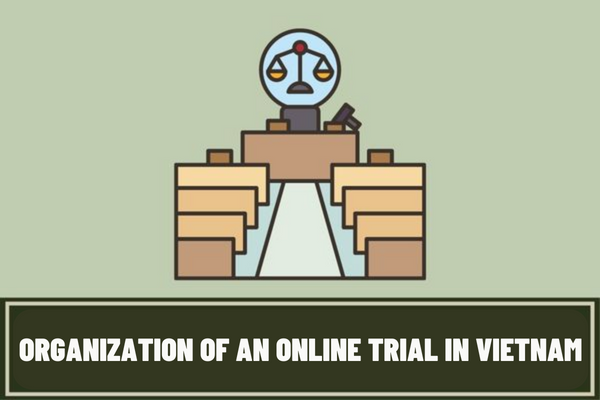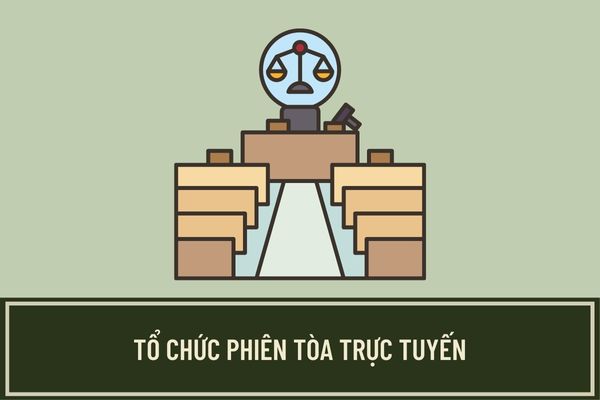What are the cases in which the People's Court can hold an online trial in Vietnam according to current regulations?
- What are the cases in which the People's Court can hold an online trial in Vietnam according to current regulations?
- What are the cases in which the People's Court cannot hold an online trial in Vietnam?
- How is the online trial held?
- What are the requirements for participating in an online trial in Vietnam?
What are the cases in which the People's Court can hold an online trial in Vietnam according to current regulations?
According to Clause 1, Article 1 of Resolution No. 33/2021/QH15 stipulating the organization of an online trial as follows:
Online trial
1. People's courts may hold online court sessions for first-instance trial and appellate trial of criminal, civil or administrative cases with simple circumstances and nature; Documents and evidences in the case file are clear, except for the following cases:
a) Criminal, civil or administrative cases related to state secrets;
b) A criminal case for one of the crimes of infringing upon national security specified in Chapter XIII of the Criminal Code;
c) A criminal case for one of the crimes of undermining peace, against humanity and war crimes specified in Chapter XXVI of the Criminal Code.
...
Thus, the People's Court is entitled to organize online court sessions for first-instance trial and appellate trial of criminal, civil and administrative cases:
- There are simple circumstances or nature;
- Documents and evidences in the case file are clear.

What are the cases in which the People's Court can hold an online trial in Vietnam according to current regulations?
What are the cases in which the People's Court cannot hold an online trial in Vietnam?
According to Clause 1, Article 1 of Resolution No. 33/2021/QH15 providing for the organization of an online trial, the People's Court may not hold an online trial in the following cases:
- Criminal, civil and administrative cases related to state secrets;
- A criminal case for one of the crimes of infringing upon national security, specifically:
+ Crime of betraying the Fatherland;
+ Crime of activities aimed at overthrowing the people's administration;
+ Crime of espionage;
+ Crime of infringing upon territorial security;
+ Crime of riot;
+ Crime of terrorism aimed at opposing the people's administration;
+ Crime of destroying material and technical foundations of the Socialist Republic of Vietnam;
+ Crime of sabotaging the implementation of socio-economic policies;
+ Crime of undermining the unity policy;
+ Crime of making, storing, spreading or propagating information, documents and items aimed at opposing the State of the Socialist Republic of Vietnam;
+ Crime of disrupting security;
+ Crime of destroying detention facilities;
+ Crime of organizing, forcing or inciting others to flee abroad or stay abroad in order to oppose the people's administration;
+ Crime of fleeing abroad or staying abroad to oppose the people's administration;
- A criminal case for one of the crimes of undermining peace, against humanity and war crimes, specifically:
+ Crimes of undermining peace, causing wars of aggression;
+ Crime against humanity;
+ War criminals;
+ Crime of recruiting, training or using mercenaries;
+ Crime of being a mercenary.
How is the online trial held?
According to Clause 2, Article 1 of Resolution No. 33/2021/QH15 stipulating the organization of an online trial as follows:
Online trial
...
2. An online trial is a trial held in a courtroom, using electronic devices connected to each other through the network environment, allowing the accused, victims, litigants, and participants in the prosecution. Other proceedings participate in the trial at a location outside the courtroom decided by the Court, but still ensure to directly monitor fully the images and sounds and participate in the order and proceedings of the trial by word of mouth, by conducting proceedings continuously, publicly, at the same time.
3. The organization of an online trial must comply with the provisions of law; ensure security and safety of network information and conditions of physical and technical foundations; ensure the dignity of the court.
Thus, an online trial is a trial held in a courtroom, using electronic devices connected to each other through the network environment, allowing the accused, victims, litigants and participants other proceedings to participate in the trial at a location outside the courtroom decided by the Court but still ensure to directly monitor fully the images and sounds and participate in the order and proceedings of the trial by word of mouth, by conduct proceedings continuously, publicly, at the same time.
What are the requirements for participating in an online trial in Vietnam?
Pursuant to Article 11 of Joint Circular No. 05/2021/TTLT-TANDTC-VKSNDTC-BCA-BQP-BTP on requirements for participating in an online trial as follows:
Requirements when participating in an online trial
1. Comply with the rules of the courtroom.
2. Always leave the electronic device open with the camera and microphone on; only when asked to speak.
3. Do not create other noises while the electronic device is open, affecting the trial.
4. Court session participants must wear proper attire; not get up or leave during the trial without the permission of the presiding judge; do not take pictures, record audio, record video, record video with sound, distribute documents or spread account information to log in to the online trial system, or live stream the trial in cyberspace.
5. The involved parties, victims, defense counsels, defense counsels of the legitimate rights and interests of involved parties and victims participating in online court sessions must present one of the identification papers (such as ID card, citizen identity card, passport, lawyer’s card, legal assistant card) for comparison.
In case the involved parties authorize another person to participate in the proceedings, the authorized person must also present a written authorization.
Thus, the requirements when participating in an online trial are:
- Comply with the rules of the courtroom.
- Always leave the electronic device open with the camera and microphone on; only when asked to speak.
- Do not create other noises while the electronic device is open, affecting the trial.
- Participants in court sessions must wear proper attire; do not get up or leave during the trial without the permission of the presiding judge
- Participants in the trial must not take photos, record audio, record video, record video with sound, distribute documents or distribute account information, log into the online trial system, or stream the trial directly on cyberspace.
- The involved parties, victims, defense counsels, defenders of the legitimate rights and interests of involved parties and victims participating in an online trial must present one of their identification papers (such as people's identity card, citizen identity card, passport, lawyer card, legal assistant card) for comparison.
- In case the involved parties authorize another person to participate in the proceedings, the authorized person must also present a written authorization.
LawNet

